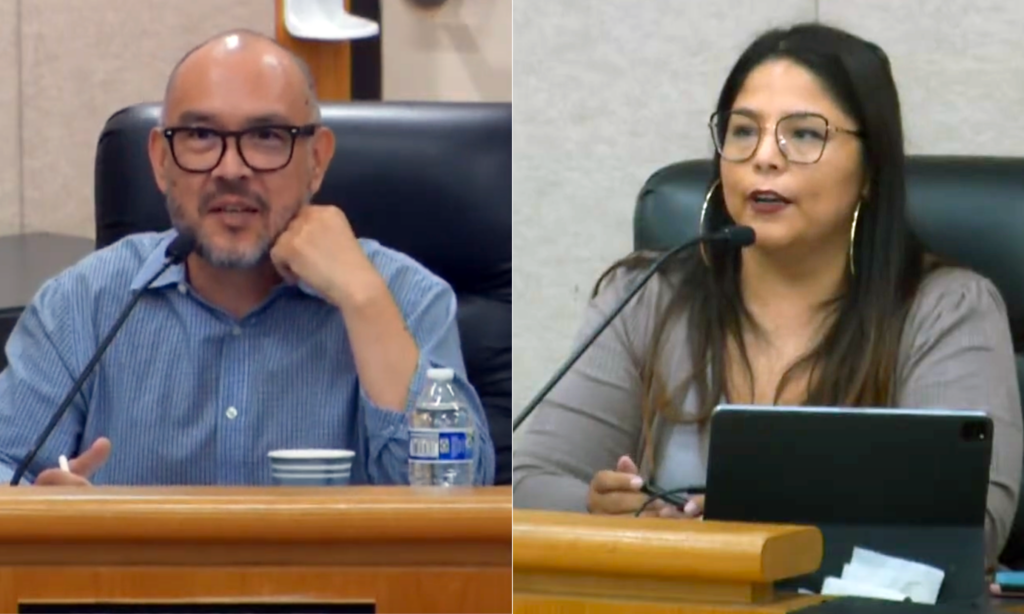
Santa Ana Unified board President Carolyn Torres, right, and board member Rigo Rodriguez speak at the board meeting on August 27, 2024. Both sit on the district’s Select Committee on Ethnic Studies.
Credit: YouTube / Santa Ana Unified
The hearing on the case has been rescheduled to Friday, Oct. 25 at 10 a.m. in Orange County Superior Court. The court gave no reason for the change. Updated Sept. 16.
Santa Ana Unified staff members on a steering committee led by two school board members expressed antisemitic views while designing new ethnic studies courses, newly released legal documents reveal.
The comments have tainted the new courses, which were written out of public view, in violation of state law, according to the motion asking a state court to invalidate the courses.
“The students of Santa Ana will be taught damaging, biased views about Jews and Israelis — views that the State has expressly warned school districts against teaching,” the 31-page document reads. “Once these biases are imparted onto impressionable youth, they cannot so easily be undone.”
Attorneys for two nationally known Jewish legal groups — the American Jewish Committee and the Louis D. Brandeis Center for Human Rights under Law — are asking the court to throw out four ethnic studies courses that they say are biased against Jews and that the school board passed in violation of the Brown Act, which requires open meetings with advance notice to the public. They want a court to order compliance with the Brown Act as a condition for working further on ethnic studies curricula.
A judge for Orange County Superior Court has set a hearing on Sept. 19 to consider the motion. The initial lawsuit in the case was filed in August 2023.
The attorneys uncovered prejudiced remarks through depositions, affidavits, documents, text messages and emails that the district turned over in response to subpoenas.
One ethnic studies steering committee member, identified in the memorandum as “Employee 1,” referred to the Jewish Federation of Orange County as “racist [Z]ionists” to whom the District should not “cave” in a text to another district employee. In a deposition, Employee 1 called the Jewish Federation “racist Zionists.”
Employee 1 referred to the lone Jewish member of the steering committee in a chat as a “colonized Jewish mind,” as well as a “pretender,” a “f—— baby,” and as “stupid” because of the person’s reservations about some of the committee’s work.
In an online chat, the Jewish member wrote this summary of what he heard when he and the other members were preparing to meet with the Jewish Federation: “Jews greatly benefit from White privilege and so have it better,” and “We don’t need to give both sides. We only support the oppressed, and the Jews are the oppressors.”
The Jewish member continued, “When I very respectfully said that those comments were personally offensive and racist, (name redacted) told me to ‘check my tone’ so as not to “ruin the spirit and mood of the room.”
The lawsuit focuses on the work of the ethnic studies steering committee. Since its inception in March 2020, school board members Carolyn Torres and Rigo Rodriguez have served on the committee; one veteran administrator said they ran it “like a dictator.” They enlisted only staff members to the project who agreed with their views. They “consisted of a narrow and insular group of individuals who were close to the board members and were ‘handpicked’ to promote a ‘very pro-ethnic studies’ vision, without any “naysayers,” the complaint said.
Torres, the current board president, is a seventh-grade teacher and longtime ethnic studies advocate. Rodriguez is an associate professor in the Department of Chicana/o and Latina/o Studies at CSU Long Beach. Both were deposed in this lawsuit.
Torres is not cited in the complaint with making antisemitic remarks. The complaint said Rodriguez “freely shared in his deposition his reductive belief that Jewish Americans are ‘racialized as under the White category,’ which is why they do not belong in the ethnic studies curriculum.
The committee has adopted a “liberated” ethnic studies orthodoxy, the complaint said, that “classifies Jewish people as white — regardless of their actual skin color or historical perceptions of Jews as nonwhite — and the Jewish people as oppressors.”
The “liberated” perspective frames ethnic studies as a struggle against white supremacy, capitalism and the legacy of European imperialism, in which Israel is a modern outpost. The liberated approach was woven into the first draft of the state’s Ethnic Studies Model Curriculum Framework, but the State Board of Education criticized it and ordered it rewritten in 2019.
When it passed Assembly Bill 101 in September 2021, mandating that all high school graduates take an ethnic studies course for a diploma, the Legislature stated that districts should not include unadopted content from earlier drafts of the framework. The Newsom administration and state Attorney General Rob Bonta have reiterated that warning in guidance to districts.
Despite this rebuke, Santa Ana’s steering committee “created a curriculum animated by the rejected draft of the Model Curriculum, including portions that were removed due to bias,” the complaint said.
Behind closed doors
For years, the steering committee worked, as one member put it, “under the radar” to avoid scrutiny from the public, especially Jews.
When it came time to present two ethnic studies courses to the full school board, two senior district officials in text messages suggested scheduling the approval on a Jewish holiday so that Jews would not attend. “We may need to use Passover to get all new courses approved,” one suggested. The other official responded, “That’s actually a good strategy.”
The select committee has no community members, and the district has not published the names of the staff members on the committee. However, one active member is Roselinn Lee, a curriculum specialist for the district who was among State Board of Education’s appointees to an advisory committee for the ill-fated first draft of the state model curriculum framework. After the state board ordered it rewritten because of bias, Lee and the other advisers, primarily CSU and UC ethnic studies faculty members, disavowed the framework and denounced “the pressures and influences of white supremacist, right-wing, conservatives” in a letter to the state board. They created the Liberated Ethnic Studies Model Curriculum Consortium as an alternative.
Santa Ana’s school board subsequently hired the Xicanx Institute for Teaching and Organizing (XITO), a consultancy group, to train teachers in the district’s ethnic study courses. Its leader, Sean Arce, is a team member of the Liberated Ethnic Studies Model Curriculum Consortium. The complaint characterizes his social media postings as “an extended anti-Israel and extremist screed,” including an April 11, 2022, Facebook post that denounces “Zionist control of the CA Ethnic Studies Model Curriculum.”
At a meeting earlier this week, the Santa Ana board renewed a contract with XITO for $80,633 for 11 days of professional development training in ethnic studies.
Redacted names
Attorneys for the complainants have redacted the names of select committee members who made antisemitic remarks from exhibits that have been made public. Marci Miller, an attorney for the Brandeis Center, said, “We sued the district itself, and we want the focus to be on the district, not on these individuals. We don’t want individuals attacked by the public, because obviously what they did was outrageous and heinous. However, that is not what we’re suing for.”
In a statement this week, the district denied allegations that it violated the Brown Act and that it approved materials for teachers that negatively portrayed the state of Israel and the Jewish community. It will defend its actions approving ethnic studies courses at the September hearing, it said. “The District denies these claims and will present counterarguments and facts to the Court for consideration and is optimistic that the Court will ultimately find in favor of the District.”
The complaint said that three Jewish community groups reached out over two years to express interest in the select committee’s work and support for the state’s model ethnic studies curriculum. Board members and the select committee ignored all the inquiries, it said.
The Jewish community, the attorneys for the complainants wrote, “was seen simply as a roadblock to their vision rather than a stakeholder and constituency that deserved to be heard.” Orange County, with Santa Ana as its second largest city, had 87,000 Jewish residents in 2020. In 2022, the county had 3.12 million residents.
The complainants argue the select committee falls under the Brown Act, because the school board created it indefinitely as a legislative body with no end date. The complaint said that the committee has met monthly and set agendas but did not publish them or open meetings to the public, in violation of the law.
Approved with no discussion
The strategy of secrecy kept the public in the dark. State law under AB 101 requires school boards to present proposed ethnic studies curricula twice, first at an information hearing intended to encourage discussion and then for formal consideration at a second board meeting.
The select committee presented the World Geography and World Histories ethnic studies courses to the school board in spring 2023. The board treated the item perfunctorily; there was no discussion, public comment or presentation by the select committee. It consisted of “merely reading the titles of the courses. The entire ‘presentation’ was over in less than thirty seconds,” the memorandum said.
The school board then approved the courses at its April 25, 2023 meeting without discussion after one member of the Jewish community who “heard about the courses and could attend the meeting in time to make a public comment” objected. Only subsequently, after they learned about the content, did Jewish residents show up at meetings to urge the board to change its mind, to no avail.
The Jewish community “had expressed their concerns throughout the process, unaware that the process was taking place behind closed doors by this secretly run committee,” said Miller. “There was no way of knowing what was coming to the board and that it would be essentially rubber-stamped when it got there.”
“There is reason to require that meetings have to be open to the public,” said Miller. “When the Brown Act is not followed, people can be free to impose their ideology. When nobody is watching, people will be left to their own prejudices.”
To prevent scenarios like the one depicted in Santa Ana, the Legislative Jewish Caucus joined Assemblymembers Rick Zbur, D-Los Angeles, and Dawn Addis, D-Morro Bay, in authoring legislation that would strengthen AB 101’s public disclosure provisions. Assembly Bill 2918 would have required school districts to create a committee of teachers, parents and representatives of community organizations “with experience assisting children build cultural awareness and understanding” to review proposed ethnic studies curricula and materials. Districts would also have to notify parents how they could participate in the review or comment on the proposed courses and materials.
Faced with strong opposition from UC and CSU ethnic studies faculties and the California Teachers Association, the authors pulled the bill this month and said they would continue negotiations for a new bill next year.




